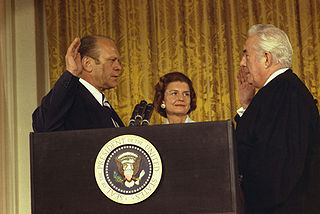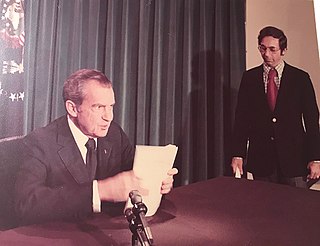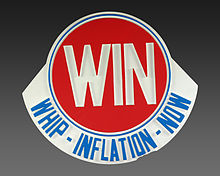
The history of the United States from 1964 to 1980 includes the climax and end of the Civil Rights Movement; the escalation and ending of the Vietnam War; the drama of a generational revolt with its sexual freedoms and use of drugs; and the continuation of the Cold War, with its Space Race to put a man on the Moon. The economy was prosperous and expanding until the recession of 1969–70, then faltered under new foreign competition and the 1973 oil crisis. American society was polarized by the ultimately futile war and by antiwar and antidraft protests, as well as by the shocking Watergate affair, which revealed corruption and gross misconduct at the highest level of government. By 1980 and the seizure of the American Embassy in Iran, including a failed rescue attempt by U.S. armed forces, there was a growing sense of national malaise.

Elizabeth Anne Ford was the first lady of the United States from 1974 to 1977, as the wife of President Gerald Ford. As first lady, she was active in social policy and set a precedent as a politically active presidential spouse. Ford also was the second lady of the United States from 1973 to 1974 when her husband was vice president.
The Community Development Block Grant (CDBG), one of the longest-running programs of the U.S. Department of Housing and Urban Development, funds local community development activities with the stated goal of providing affordable housing, anti-poverty programs, and infrastructure development. CDBG, like other block grant programs, differ from categorical grants, made for specific purposes, in that they are subject to less federal oversight and are largely used at the discretion of the state and local governments and their subgrantees.
Buckley v. Valeo, 424 U.S. 1 (1976), was a landmark decision of the US Supreme Court on campaign finance. A majority of justices held that, as provided by section 608 of the Federal Election Campaign Act of 1971, limits on election expenditures are unconstitutional. In a per curiam opinion, they ruled that expenditure limits contravene the First Amendment provision on freedom of speech because a restriction on spending for political communication necessarily reduces the quantity of expression. It limited disclosure provisions and limited the Federal Election Commission's power. Justice Byron White dissented in part and wrote that Congress had legitimately recognized unlimited election spending "as a mortal danger against which effective preventive and curative steps must be taken".

Gerald Ford's tenure as the 38th president of the United States began on August 9, 1974, upon the resignation of president Richard Nixon, and ended on January 20, 1977. Ford, a Republican from Michigan, had been appointed vice president since December 6, 1973, following the resignation of Spiro Agnew from that office. Ford was the only person to serve as president without being elected to either the presidency or the vice presidency. His presidency ended following his narrow defeat in the 1976 presidential election to Democrat Jimmy Carter, after a period of 895 days in office.

Gerald Rudolph Ford Jr. was an American politician who served as the 38th president of the United States from 1974 to 1977. He previously served as the leader of the Republican Party in the U.S. House of Representatives from 1965 to 1973, and as the 40th vice president under President Richard Nixon from 1973 to 1974. Ford succeeded to the presidency when Nixon resigned in 1974, but was defeated for election to a full term in 1976. Ford is the only person to serve as president and vice president without being elected to either office.

The Quit India speech was given by Mahatma Gandhi on the eve of the Quit India movement, August 8, 1942. His address was issued shortly before midnight at the Gowalia Tank Maidan park in Bombay, which has since been renamed August Kranti Maidan.

Jimmy Carter's tenure as the 39th president of the United States began with his inauguration on January 20, 1977, and ended on January 20, 1981. Carter, a Democrat from Georgia, took office following his narrow victory over Republican incumbent president Gerald Ford in the 1976 presidential election. His presidency ended following his landslide defeat in the 1980 presidential election to Republican Ronald Reagan, after one term in office. Aged 99, he is the oldest living, longest-lived and longest-married president, and has the longest post-presidency. He is the fourth-oldest living former state leader.

The Food and Fuel Control Act, Pub. L.Tooltip Public Law 65–41, 40 Stat. 276, enacted August 10, 1917, also called the Lever Act or the Lever Food Act was a World War I era US law that among other things created the United States Food Administration and the United States Fuel Administration.

The inauguration of Gerald Ford as the 38th president of the United States was held on Friday, August 9, 1974, in the East Room of the White House in Washington, D.C., after President Richard Nixon resigned due to the Watergate scandal. The inauguration – the last non-scheduled, extraordinary inauguration to take place in the 20th century – marked the commencement of Gerald Ford's only term as president. Chief Justice Warren E. Burger administered the oath of office. The Bible upon which Ford recited the oath was held by his wife, Betty Ford, open to Proverbs 3:5–6. Ford was the ninth vice president to succeed to the presidency intra-term, and he remains the most recent to do so, as of 2024.
Russell W. Freeburg is an American journalist who was a former managing editor and Washington bureau chief for the Chicago Tribune. He is the co-author of a book on the role of oil in World War II.

After losing re-election to Republican Benjamin Harrison in 1888 and leaving office in 1889, U.S. President Grover Cleveland was initially satisfied with his return to private life. However, Cleveland's views about his retirement began to change at the time of the 1890 midterm elections, in which the Democrats won huge victories at the ballot box. In addition, Cleveland disliked what he perceived to be the frequent blunders of the Harrison administration. By the time 1891 ended, Grover Cleveland decided to re-enter American political life and run again for U.S. president in the 1892 U.S. presidential election.

On August 8, 1974, U.S. President Richard Nixon delivered a nationally-televised speech to the American public from the Oval Office announcing his intention to resign the presidency the following day due to the Watergate scandal.

This article lists those who were potential candidates for the Republican nomination for Vice President of the United States in the 1976 election. At the 1976 Republican National Convention, incumbent President Gerald Ford narrowly won the presidential nomination over former California Governor Ronald Reagan. Ford had decided not to choose Vice President Nelson Rockefeller as his running mate, due to Rockefeller's unpopularity with the right wing of the Republican Party. He instead chose Senator Bob Dole of Kansas. Dole was acceptable to the conservative wing of the party, and Ford hoped that Dole would help the ticket win the western states and the agricultural vote. The Ford–Dole ticket lost the general election to the Carter–Mondale ticket. Though he would not win the presidential nomination, Reagan announced before the convention that he would pick Senator Richard Schweiker of Pennsylvania as his running mate. Dole went on to become Senate Republican leader, and the Republican presidential nominee in 1996, losing the general election to incumbent President Bill Clinton.

On October 10, 1973, Vice President Spiro Agnew was forced to resign following a controversy over his personal taxes. Under the terms of the 25th Amendment, a vice presidential vacancy is filled when the president nominates a candidate who is confirmed by both houses of Congress. President Richard Nixon thus had the task of selecting a vice president who could receive the majority support of both houses of Congress, which were then controlled by the Democrats.
Gerald Ford was the 38th president of the United States, serving from 1974 to 1977. After his tenure's end, Ford was active in the public sphere, traveling, writing a memoir, and voicing his opinion about contemporary issues within the United States and abroad.

The United States foreign policy during the 1974–1977 presidency of Gerald Ford was marked by efforts to de-escalate the Cold War. Ford focused on maintaining stability and promoting détente with the Soviet Union. One of Ford's key foreign policy achievements was the signing of the Helsinki Accords in 1975. The accords were a series of agreements between the US, Soviet Union, and other European countries that aimed to promote human rights, economic cooperation, and peaceful relations between East and West. Ford met with Soviet leader Leonid Brezhnev several times, and the two countries signed the Strategic Arms Limitation Talks in 1979, which aimed to limit the number of nuclear weapons held by the two superpowers.
The following is a timeline of the presidency of Gerald Ford from August 9, 1974, when Ford became the 38th president of the United States, upon the resignation of Richard Nixon, to December 31, 1974.
The 1976 presidential campaign of Jimmy Carter resulted in the election of Jimmy Carter and his running mate Walter Mondale as president and vice president of the United States, defeating incumbent Republican President Gerald Ford and his running mate Bob Dole. Carter, a Democrat and former governor of Georgia, launched his presidential bid in December 1974, as the Constitution of Georgia barred him from running for a second term as governor. In the wake of the Watergate scandal, the declining popularity of President Ford due to his pardon of Nixon, and the severe recession of 1974–75, many Democrats were sure of victory in the 1976 presidential election. As a result, 17 Democrats ran for their party's nomination in 1976. Carter's opponents mocked his candidacy by saying "Jimmy, who?", for his being relatively unknown outside Georgia. In response, Carter began saying "My name is Jimmy Carter, and I'm running for president." Carter extensively campaigned in the primaries, and in the end received 39.19% of his party's primary votes.


























